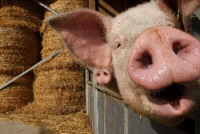



Medical Inspection to Measure 2003 CAP Overhaul
EU - Last week Members of Parliament's Agriculture Committee gave a green light to the broad themes of the Commission's "CAP health check". |
| Picture: EU Parliament news |
This "medical inspection" is intended to check the progress of Agriculture reform since the CAP was overhauled in 2003. Backing a report drafted by German Member Lutz Goepel (EPP-ED), MEPs also called for direct aid to farmers and increases in dairy quotas to be applied to EU states voluntarily. We spoke to a few MEPs to gauge their views on the state of the CAP.
The Common Agricultural policy was initially established in 1957 and began operation five years later. It was a response to the food shortages of the great depression, the war years and the subsequent post war scarcities. By supporting production through guaranteed prices it was hoped to boost output and ensure price stability for the farming community.
With food shortages in the European Community becoming a thing of the past, the CAP supporters heralded it as a major breakthrough in European cooperation. However, by the 1980's wine lakes and butter mountains had shown the policy in need of reform. The 1990's saw the process of reform commence but it was not until 2003 that the policy was overhauled substantially.
Farmers as "stewards", not exploiters of the land
The 2003 reforms gave farmers more freedom to produce what they the market required rather than just producing for the sake of it. British Conservative MEP Neil Parish - Chair of the Agriculture Committee - explained to us that "decoupling payments from production has made farmers farm the market, rather than farming the subsidy". Overall the agriculture committee want the faster decoupling of production aid to farmers which they believe has made the agriculture business more market orientated.
The reforms also set up "single farm payments" scheme more geared towards the environment, food safety and animal welfare schemes. Neil Parish also spoke about the impact this could have on the image of the policy: "previously, the CAP was a symbol of the wasteful spending of the EU, but now farmers are being given payments to act as environmental stewards and to maintain areas of natural beauty in our countryside".
The 2003 reforms also prepared the CAP for a further 10 new members when the EU enlarged in 2004. One of these was to introduce direct aid to farmers in the new states progressively from 25% in 2004 to 100% in 2013.
French Socialist MEP Bernadette Bourzai MEP is the vice-chair of the Agriculture Committee. Speaking to us she said the most important part was "to subordinate the total payment of agricultural aid to necessary respect for the environment, traceability, food security, health and good conditions for animals and transparency".
A CAP that fits for the future?
As for the future of European agriculture, both MEPs saw the problem of young farmers abandoning the land as particularly worrying for the future. They also see the falling numbers of sheep and livestock as a problem (the European Union is increasingly dependent on meat imports). They also want more support for rural development and a common EU policy on GMO crops.
As Neil Parish says "the most significant challenge will be to develop mechanisms that encourage local production to continue, without invoking protectionism to block foreign agricultural imports".









